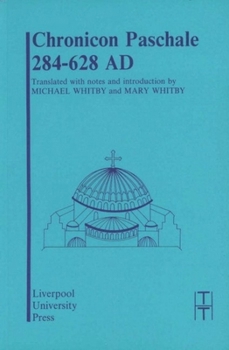< Back to Search Results
Chronicon Paschale 284-628
The Chronicon Paschale is one of the major constituents of the Byzantine chronographic tradition covering the late antique period.
Format:Paperback
Language:English
ISBN:085323096X
ISBN13:9780853230960
Release Date:February 1989
Publisher:Liverpool University Press
Length:280 Pages
Weight:0.80 lbs.
Dimensions:0.7" x 5.6" x 7.9"
Related Subjects
History Political Science Politics & Social Sciences Religion Religion & SpiritualityCustomer Reviews
1 rating
Chronicon Paschale
Published by Thriftbooks.com User , 15 years ago
The Chronicon Paschale is typical of Byzantine world chronicles in that it begins with the creation of the world. As that would significantly expand this volume, the Whitbys have chosen to start it in 284 with Diocletian, at the point where it actually begins to contain useful information. It is a good starting point for late antiquity and for the text, as it gives the book a decent length, even though in the early period the anonymous author has very little to say. Although throughout this time the text runs parallel to Malalas and more focused sources, it does contain useful information on Theodosius II and Justinian, for example, as well as Constantinople. However, the Chronicon Paschale becomes a major source in its own right for the early rule of Herakleios, where it preserves a number of missives and first-hand accounts of the Avar siege in 626. While it seems to be of little importance to later Byzantine chroniclers, its information on Herakleios, Constantinople itself and the interesting dating system of the author make it a particularly valuable source. That said, I'm only reviewing the volume, due to the fact that we're simply fortunate to have many of the ancient texts that we do. The Whitbys translation is very clear, but the notes really make this book shine. On a typical page, the notes cover half of it, and provide references to Malalas and Theophanes and other relevant sources, as well as explanations and references to scholarly works. It would have been nice if the Greek text had been provided, but for $25 I won't complain. This is an essential Byzantine text.





